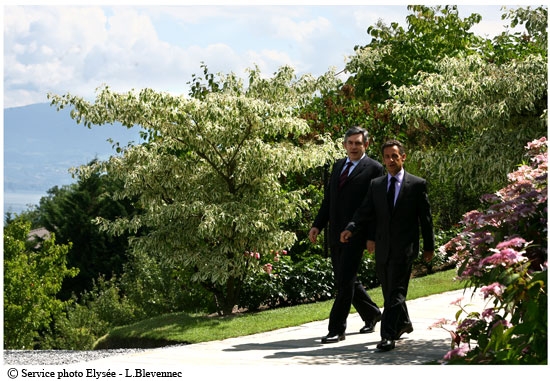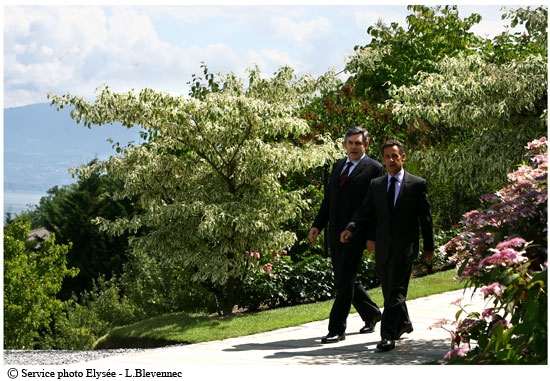At home he is almost universally seen as a politician running out of time, but Prime Minister Gordon Brown continues to stride onto the international stage as if he were guaranteed many more years in power. He may have lost his rapport with the British public, chalked up blunder after blunder, and already faced two attempted coups by fellow Labourites in Parliament, but he continues to try to “save the world.”
 Nicolas Sarkozy and Gordon Brown talk Monday during a pre-G8 summit in Evian, France. Both leaders support a new international accord on greenhouse gases, but Brown has gone further than other G8 leaders, advocating that rich nations spend billions to support climate adaptation and clean energy programs in poor countries.Courtesy Elysee.frWe know that is what Brown thinks he’s doing, because he used that very phrase when under pressure recently in the House of Commons. In Britain’s rather puerile political discourse, this was enough to condemn him to instant and recurrent mockery. But there is every sign that this somewhat serious son of a Church of Scotland minister really believes it.
Nicolas Sarkozy and Gordon Brown talk Monday during a pre-G8 summit in Evian, France. Both leaders support a new international accord on greenhouse gases, but Brown has gone further than other G8 leaders, advocating that rich nations spend billions to support climate adaptation and clean energy programs in poor countries.Courtesy Elysee.frWe know that is what Brown thinks he’s doing, because he used that very phrase when under pressure recently in the House of Commons. In Britain’s rather puerile political discourse, this was enough to condemn him to instant and recurrent mockery. But there is every sign that this somewhat serious son of a Church of Scotland minister really believes it.
Brown made the boast in a reference to his attempts to lead the global response to the international financial crisis. And it is true that, whatever his role in helping to cause the credit meltdown in the first place, he did react decisively. Now he is extending his self-imposed mission to combatting global warming, launching a campaign that he somewhat immodestly says “will effectively change the world.”
Brown claimed this when answering questions after a speech on climate change he made recently in the unlikely surroundings of London Zoo. The speech received almost no media attention because he had the misfortune to deliver it on the morning after the death of Michael Jackson. But it did contain an important proposal, deliberately put on the table in time for this week’s climate gathering in Italy, with just might break the deadlock in the international negotiations leading up to December’s vital climate conference in Copenhagen.
The talks are deadlocked because, even though time is rapidly ticking away, no one has been prepared to make the first significant move. Emissions cuts so far offered by rich nations amount in total to a reduction of about 8 to 14 percent in 1990 levels by 2020, a third of the 25-40 percent they agreed to make in principle 18 months ago in Bali.
Developing countries, for their part, are refusing to make pledges on reducing the rate of growth of their emissions — an essential part of any deal — because industrialized nations are neither doing enough at home nor offering funds to help them fight, and adapt to, climate change. Serious money was promised, and the EU undertook to specify what it should be by last spring. But EU finance ministers have so far refused to name a sum, fearing that they will just be asked for more.
The result has not just ensured that the already sclerotic UN negotiations made no real progress, but blighted President Obama’s attempt to inject some energy into the process through this week’s meeting, held alongside the annual G8 summit. So Gordon Brown’s proposal, which was discussed and agreed in depth in his cabinet, was both targeted and timed to try to break the impasse.
Brown suggested a financial package to be worth around $100 billion a year by 2020 for funding low carbon technologies to reduce emissions, strategies to prevent deforestation, and adaptation measures in developing countries. He proposed that the money should be raised from an expanded and reformed carbon market, a limited amount of official overseas aid, and new mechanisms which could include funds from reducing emissions from aviation and shipping.
And he did not stop there. Over the next week he rang both Obama and Wen Jiabao of China to canvass their support, and is working his way around most of the other leaders at the summit before they actually meet. He does not expect agreement on the idea in Italy, but hopes that governments will work on it over the next two months in time for the next climate summit, called by UN Secretary General Ban Ki-Moon, in New York in September.
Brown made a bold move, for it meant breaking ranks with the rest of the industrialized world, and defying countries like France that had explicitly pressed him not to do so. And no one knows if it will work, though there has been some public support on Denmark (host of the the December meeting) and the vulnerable, low-lying countries of Bangladesh and the Maldives.
But something is desperately needed to provide a focus for serious, specific negotiations to begin as Copenhagen comes ever closer. And experience shows that there is rarely a breakthrough unless one leader and his or her government shows enough commitment to drive it.
If Gordon Brown can provide it — and follows through until agreement on a new treaty is finally reached — history will regard him much better than do today’s commentators. And it may even judge that he did, indeed, “save the world.”
—
Below, watch Brown’s speech laying out his “road to Copenhagen” proposal:


